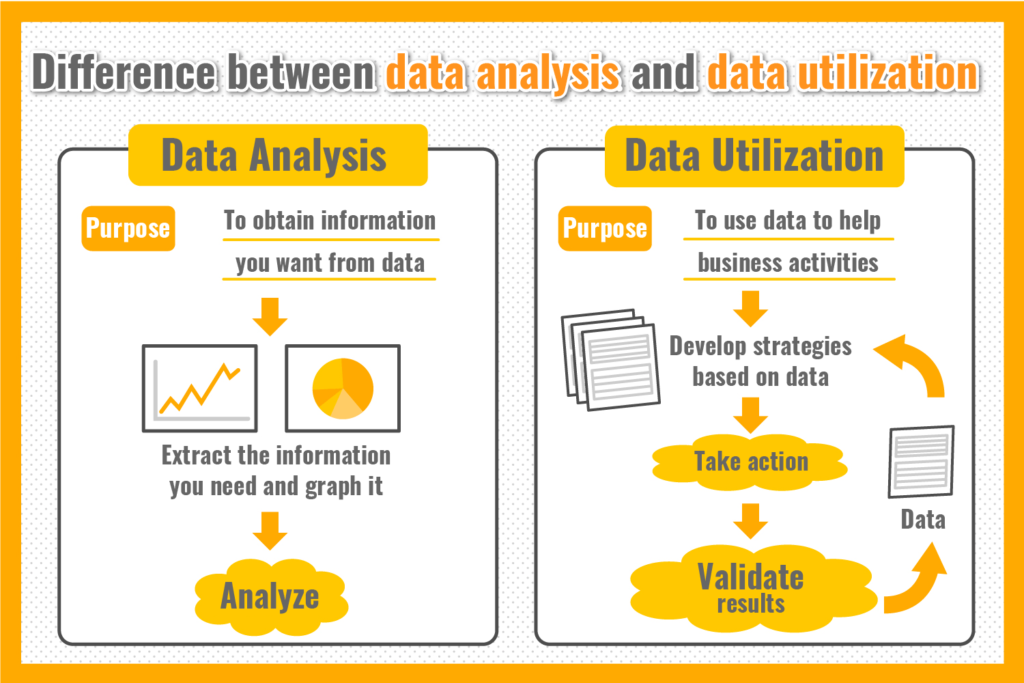What is Data Utilization? Introducing the Benefits and How it can be Utilized in Different Industries
With the advancement of digitalization, an enormous amount of data is being generated in the business world. Many companies are adopting the concept of “data utilization” to analyze these data and utilize them for business purpose. In order to promote efficient data utilization, it is important to keep in mind the benefits and utilization methods for each industry.
This column provides a detailed overview of data utilization. We will also introduce the benefits and how it can be utilized in each industry.
What is Data Utilization?
Data utilization refers to the continuous use of data in corporate activities to improve operational efficiency and productivity for the benefit of the business.
Recently, there are more and more opportunities that we hear the term “Data Driven.” It refers to making business decisions and solving problems based on data, rather than relying solely on past experience and intuition.
Data utilization is one of the essential means to achieve data driven.
According to the Ministry of Internal Affairs and Communications’ “デジタルデータの経済的価値の計測と活用の現状に関する調査研究 (direct translation: Research and Study on Measuring the Economic Value and Current Status of utilizing Digital Data) (2020),” approximately 90% of large companies and more than half of small and medium-sized companies report that they are using data in their businesses. It can be said that companies efforts to utilize data are becoming more and more active.
Difference Between Data Analysis and Data Utilization

Now, what exactly is the difference between data analysis and data utilization? Let’s look at the differences, starting with the purpose of each.
Purpose of Data Analysis
The purpose of data analysis is to obtain the information you want to know from the data.
As it is, data is just a collection of numbers and letters, so it needs to be processed to make it easier to obtain information. For example, graphs make the data visible and easier to analyze.
Furthermore, by looking for regularities, outliers, correlations, and causal relationships, the data becomes meaningful for the first time.
For data analysis, knowledge of statistics and data processing techniques will allow for deeper analysis, while BI tools allow for more advanced analysis without specialized knowledge or techniques.
Purpose of Data Utilization
The purpose of data utilization is to use data to help business activities. Before starting to utilize data, it is better to clarify the purpose of using data.
By doing so, it becomes easier to analyze what strategies and actions should be taken to achieve the goals. Strategies and actions will be taken based on the clues obtained from the analysis, and the effects will be verified.
By repeating this series of tasks and continuing to run the PDCA cycle for data utilization, you will be able to take more effective strategies and actions.
In order to utilize data, it is better to have practical experience and knowledge of marketing and data. The accumulation of such data and knowledge will make it easier to develop accurate strategies and verification.
As mentioned above, data analysis and data utilization are not synonymous, because the purpose of using data is different.
While the purpose of data analysis is to “extract necessary information for data utilization,” the purpose of data utilization is to “take necessary actions based on data analysis and use it for business.”
In other words, data analysis is the basis for data utilization.
There is also a difference in the skills required between the two. Data analysis requires specialized skills in processing numbers, such as statistics, while data utilization requires skills in strategy and verification such as knowledge and marketing experience based on practical experience.
Recently, there are more and more companies that leave data analysis to machines such as BI tools, while humans are responsible for data utilization.
Benefits of Using Data
What are some of the benefits that data utilization can bring to your business?
Let’s look at three of the most significant benefits.
1. Useful for Understanding the Current Situation and Predicting the Future
The first major advantage is that the use of data makes it possible to understand the current situation and predict the future.
In order to make accurate business decisions, it is important to know the business trends of your company and draw a scenario for the future. The current situation can be grasped in a short time by using data. Furthermore, it is possible to make forecasts based on the data.
For example, if sales information by product and store can be visualized in real time, it will be easier to grasp the current situation.
In addition, the combination with data-based evidence will allow us to accurately predict the future.
2. Increase the Speed of Decision Making
In business, speedy decision-making is very important. However, if you try to make decisions based on your personal subjectivity, such as your past experience or intuition, it will take time to share your perceptions with others.
Furthermore, we cannot make quick decisions since it is difficult to verify whether a decision is appropriate or not.
The utilization of data in decision making allows us to make decisions based on evidence, and also speeds up things by making it easier to share your perceptions with others. It also has the advantage of making it easier to verify the results in the future.
3. Discovering New Business Opportunities
New business opportunities may arise in the course of promoting the use of data.
Data that was meaningless on its own can be combined with a variety of other data to create a dashboard, and it might be able to highlight business issues that were previously unnoticed, or find clues that lead to ideas for new products and services.
In fact, there are many new products and services born from the utilization of data. New business opportunities may lead to increase sales for your company.
Types of Data that can be Used for Management
The vast amount of data stored in your company can be used in any business situation.
Let’s look at what kind of work it is actually used for, by each department.
Sales Department
The types of data that can be used in sales include customer data, negotiation data, and sales data.
Customer data can be classified to age, gender, location, etc., and analyzed for purchase preferences, which can be used to acquire new customers.
In addition, the sharing of best practices from negotiation data can lead to the improvement of the company’s overall sales capabilities.
Marketing Department
The types of data that can be used by marketing department include customer data, survey data, advertising data, etc.
As an example of EC site marketing, customer data such as behavioral logs and browsing history are collected, and by analyzing customer preferences, behavioral patterns can be predicted and used to display recommendations and advertisements tailored to customer needs.
Displaying recommendations and advertisements that stimulate customers’ desire to buy lead to increased sales.
Manufacturing Department
The types of data that can be used by manufacturing department include product data.
An automobile manufacturer was facing the problem of inconsistent performance of the batteries installed in their electric vehicles.
So, they aimed to constantly monitor changes in performance according to the driving environment and usage conditions using sensor data installed in the battery. This is a successful example of how the utilization of data has made it easier to predict the occurrence of problems and led to quality improvements.
How to Use Data in Each Industry
Finally, we will introduce how data is used in each industry.
Medical Industry
In the medical field, a huge amount of medical data, including electronic medical records, examination and imaging data, claim data, and research data are handled.
Numerous studies and initiatives have been conducted using these data, and the effects of data utilization have been demonstrated in all aspects such as improving medical technology and developing new drugs.
One example of this is the case where data utilization leads to preventive medicine and early detection of diseases. By collecting and analyzing a large number of patients with the same symptoms from a vast amount of medical data, the data is used to identify the disease and determine its progress.
In this way, higher quality medical care is provided using evidence based on experience and data.
Data are also being used by pharmaceutical companies in the development of new drugs.
New drug development is said to be very costly and time-consuming because there are so many development processes involved. By utilizing data, the development process has been streamlined and the cost and time involved in new drug development have been reduced.
Furthermore, analysis tools that support the utilization of vast amounts of medical data are helping to drive the utilization of data in the medical field. Tools that analyze the number of prescription days, prescription amount, etc., based on medical treatment databases enable multifaceted analysis starting from actual medical treatments such as surgeries and examinations.
Manufacturing Industry
In the manufacturing industry, the utilization of data from the Internet of Things (IoT) is advancing. Based on the data accumulated from the IoT, the operating status of multiple production lines in a factory can be centralized and visualized, enabling the status to be grasped at a glance. This is intended to improve the efficiency of progress management and productivity.
Data on how often product errors and equipment malfunctions occur is analyzed and also used to predict the occurrence of problems.
Data Utilization is the Key to Business Success and Problem Solving
There are many clues in data that can lead to business success and improvement.
The utilization of data is to decipher these clues through data analysis, develop strategies, repeat verification, and make use of them in business activities.
The use of data can provide a variety of benefits, including faster decision making and the creation of new business opportunities. In fact, there are many companies that are promoting the use of data and achieving great results in their business.
As the digitalization accelerates in the future, efforts to utilize data in companies will become more important.
For More Information, Please Contact Us Here
About Japanese Healthcare System

What you need to know about the healthcare system in Japan before using the data.
SERVICE

In addition to various web tools that allow you to easily conduct surveys via a browser using our medical database, we offer data provision services categorized into four types to meet your needs and challenges: "Analysis reports" "Datasets," "All Therapeutic Areas Data Provision Service," and "Specific Therapeutic Areas Data Provision Service.

© Medical Data Vision Co., Ltd. All Rights Reserved.





